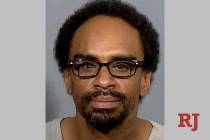Ex-wife of poker star Ivey unhappy with divorce settlement
Luciaetta Ivey does not believe that her divorce settlement with poker star Phil Ivey was fair, even though she received millions of dollars worth of property.
According to a document filed Tuesday with the Nevada Supreme Court, Luciaetta Ivey "has attempted only to secure information to confirm that she received a fair settlement."
"That Phil has refused to voluntarily provide the information that Luciaetta seeks only supports her belief that the settlement was not fair," her attorney wrote.
Luciaetta Ivey took the matter to the Supreme Court in September, when she asked the justices to disqualify the Clark County Family Court judge assigned to the sealed divorce case, Bill Gonzalez.
At that time, she raised questions about campaign contributions Phil Ivey and his lawyers had made to Gonzalez. The divorce was granted in December 2009, and the contributions were made in early 2010.
Luciaetta Ivey challenged the decision of Chief District Judge Jennifer Togliatti, who denied her motion to disqualify Gonzalez. In November, the Supreme Court ruled that Luciaetta Ivey had raised issues of "arguable merit" and gave Phil Ivey 30 days to respond.
In Phil Ivey's answer, he revealed that his ex-wife received a purse collection worth more than $1.2 million, jewelry valued at more than $1 million and $180,000 a month in alimony as part of the divorce settlement, while he accepted more than $170,000 in credit card debt and more than $15.1 million "in gambling and other debt."
The divorce settlement does award Luciaetta Ivey her jewelry "with a purported value of $1 million," according to the reply she filed this week, "but Phil ignores that his own jewelry is awarded to him with no assessed value."
Luciaetta Ivey contends the settlement agreement failed to provide specific information about the parties' assets and liabilities.
"Luciaetta had no idea then and has no idea now where Phil's money came from or where it went," her lawyer wrote.
Luciaetta Ivey hired Henderson attorney Bruce Shapiro in March after she began to question the fairness of her divorce settlement, and Shapiro brought the campaign contributions to her attention.
Gonzalez was appointed by then-Gov. Jim Gibbons in March 2009 to fill a vacant seat. Voters elected Gonzalez to the seat in November 2010.
Phil Ivey, considered one of the world's best poker players, contributed $5,000 to Gonzalez's campaign on April 17, 2010. He did not contribute to any other Family Court judge.
His divorce lawyers also made contributions to Gonzalez's campaign.
The Las Vegas lawyers, David Chesnoff and Richard Schonfeld, argued that Gonzalez no longer had jurisdiction over the divorce case when the contributions were made, because the case was closed.
But Shapiro argued that the case "is a perfect example of the adage that family law cases are never really 'closed.' "
"At the time Phil made his campaign contribution Judge Gonzalez did have jurisdiction over this matter even though the case was 'closed,' '' Shapiro wrote in the recent reply.
The matter came back before the judge in June, when Luciaetta Ivey filed a motion that raised new issues in the divorce case.
"Phil can make the claim over and over again, but the case was far from over when he made his donation," Shapiro argued.
Phil Ivey's contribution alone amounted to 7 percent of Gonzalez's cash campaign contributions. The judge raised about $71,000 in cash donations in 2010.
"There can be no doubt that when a family court litigant makes a substantial contribution to a family court judge and then appears in front of that judge only months later, that it is unseemly and raises at least the appearance of impropriety," Shapiro wrote.
Shapiro also questioned the "highly irregular alimony provision" in the Iveys' divorce settlement.
The divorce agreement included alimony for Luciaetta Ivey from the money Phil Ivey receives from Tiltware LLC, the parent company of the poker player's online sponsor, Full Tilt Poker.
According to the agreement, in the event that Phil Ivey stops receiving money from Tiltware, Luciaetta Ivey's alimony "will cease."
During a telephone interview in early November, Luciaetta Ivey told the Las Vegas Review-Journal she received monthly alimony payments from January 2010 until April 2011. She declined to disclose the amount.
The Justice Department shut down Full Tilt's operation in April, when the company's founders were indicted in federal court on charges such as bank fraud and money laundering.
Gonzalez ordered Phil Ivey to produce documents showing that his income from Tiltware had stopped, according to the reply filed this week with the Supreme Court.
The documents showed that Phil Ivey was receiving about $920,000 a month from Tiltware "from his passive interest in the company which was undisputably acquired during the marriage," Shapiro wrote.
"Under community property laws, Luciaetta would have been entitled to share equally in this asset and its income stream," according to the reply.
Instead, "Luciaetta was relegated to receiving" about $180,000 a month as taxable alimony, "while Phil enjoyed the remaining approximately $740,000," Shapiro wrote.
Phil and Luciaetta Ivey were married in Las Vegas on May 19, 2002.
According to court records, the Iveys' 2008 tax returns reflect total community income of nearly $8 million.
Last week , Luciaetta Ivey filed a federal lawsuit in Las Vegas that accuses her ex-husband, Chesnoff and attorney John Spilotro of conspiring to deprive her of her equal share of the community property acquired during the marriage.
The lawsuit also accuses Spilotro, who represented Luciaetta Ivey in the divorce proceedings, of legal malpractice. It alleges Phil Ivey paid Spilotro a flat fee of $10,000 to represent her. It also alleges Spilotro "failed to safeguard the financial interests of his client."
Las Vegas attorney Gary Logan is representing Luciaetta Ivey in the federal case.
Contact reporter Carri Geer Thevenot at cgeer@reviewjournal.com or 702-384-8710.




























